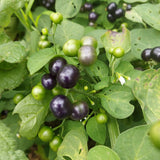Managu (Kenyan Nightshade Leaf)
Solanum scabrum
Managu is an important African vegetable. The leaves are eaten as a cooked green. Technically in the eggplant family, it also produces many small black berries that can be used to replace blueberries in almost any recipe.
Many Africans use it as a way to help treat high blood pressure and diabetes. They soak it in water like a tea and drink the water as a medicine.
This particular seed is from Kenya. This vegetable is also known as Mnavu, Mboga Chungu, Isogo, Njama Njama, and Garden Huckleberry.
Managu was grown for Truelove Seeds by Paul Mauti and Estache Sibomana, Kenyan and Burundi farmers who farm at the Roots Community Garden in Mason, MI. They share a love of growing culturally relevant crops for their communities, especially eggplant.
Photos by Greater Lansing Food Bank Garden Project.
Days to maturity: 30-45
Seeds per pack: 300
Germination rate: 69% (total viability: 73%) on 05/28/2025 (read more about viability)
Planting / harvesting notes
Managu can be direct seeded or transplanted. Germinates in 5-7 days.
We recommend sowing them indoors to get a head start on the season in cooler climates. Sow seeds ¼" deep 3-4 weeks before the last frost, and transplant 2-3' apart in the field when soil is warm after frost. That said, our Cameroonian grower friends in Texas and Oregon sow them directly in the soil in a "nursery," mixing them lightly into the soil, sown very close together, and then transplanting them well-spaced into the garden when they've reached 2" tall. They will grow bushy and sprawling.
Can be harvested 30 days after transplanting.
Seed keeping notes
Harvest the berries when fully ripe, dark, and plump. Squish out the seeds, clean them off, and dry them for two weeks in a well-ventilated place away from direct sunlight.
Or dry the ripe fruit, use your hands to break apart the dried fruit, and separate the seeds.
Or place in a blender with lots of water. Set mixture aside. Seeds will sink. Separate seeds and dry thoroughly.











